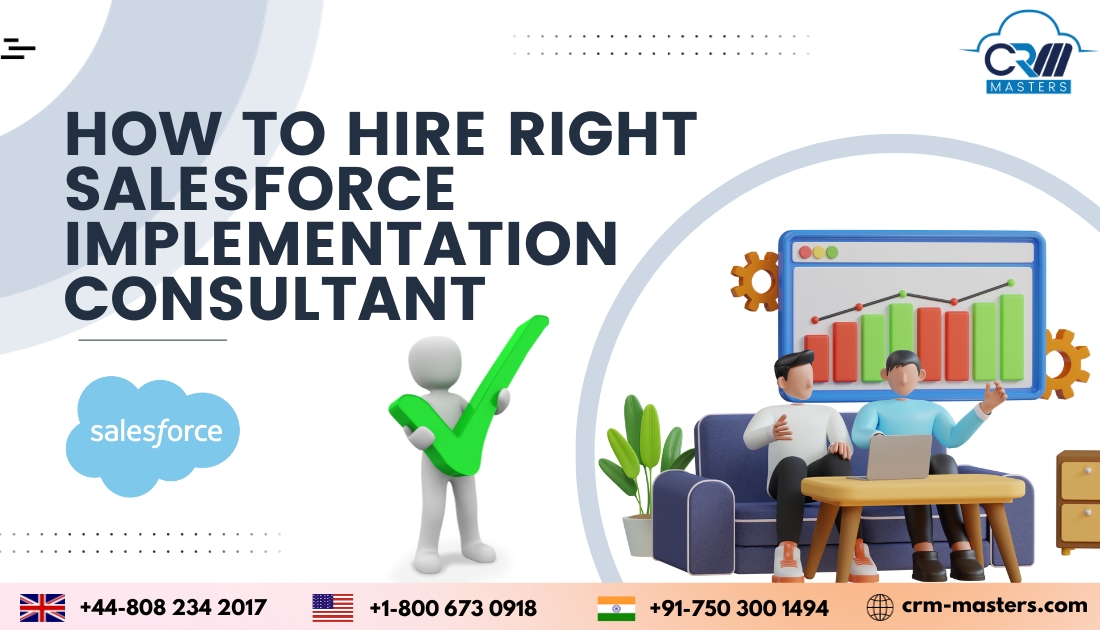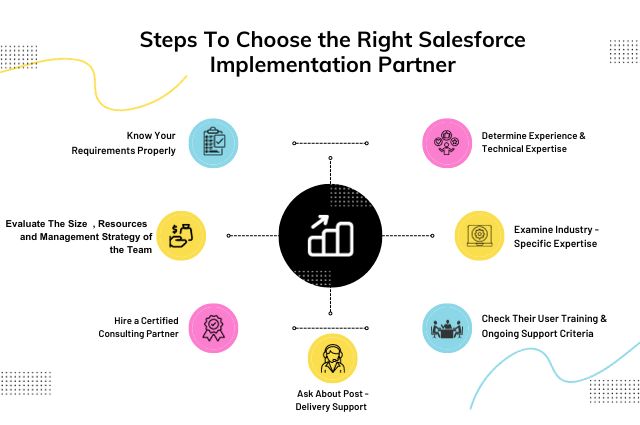
How to Choose The Right Salesforce Implementation Partner for Your Business
In today’s highly competitive business landscape, staying ahead of the curve requires efficient management of customer relationships. Salesforce, the world’s leading Customer Relationship Management (CRM) platform, is a powerful tool to help businesses achieve this. However, implementing Salesforce successfully is no easy feat. It requires careful planning, technical expertise, and the right Salesforce Consulting partner.
This blog will explore the essential steps to choose the right Salesforce implementation partner for your business needs.
Know Your Requirements Properly
The journey of implementing Salesforce begins with a clear understanding of your business requirements. You must have a well-defined plan before looking for an implementation partner. This plan should detail your objectives, goals, and expectations from the Salesforce implementation. Knowing your requirements properly will serve as a roadmap for the entire process.
Here are some key questions to consider when defining your requirements:
- What specific business processes do you want to improve or automate using Salesforce?
- Do you need Salesforce for sales, marketing, customer support, or a combination of these functions?
- What are your long-term goals, and how can Salesforce support them?
- Are there any unique challenges or industry-specific requirements that need to be addressed?
- What is your budget for Salesforce implementation?
By answering these questions, you can create a comprehensive list of requirements to guide you in selecting an implementation partner.
Evaluate the Size, Resources, and Management Strategy of the Team
The success of your Salesforce implementation project depends on your chosen Salesforce Implementation Consultant and their internal team. You must evaluate their team’s size, resources, and management strategy to ensure a smooth implementation process.
Size of the Team:
The size of the team matters because it determines the level of support and involvement they can provide during the implementation. Smaller teams might need more external support, while larger teams could have in-house resources to handle some implementation aspects.
Resources:
Assess the technical skills and availability of their team members. It’s essential to have dedicated individuals who can work closely with your team, understand the technical intricacies, and relay your business requirements effectively.
Management Strategy:
An effective management strategy is crucial to maintain alignment between your business goals and the implementation process. It’s essential to ask about their strategy to ensure the project stays on track.
Hire a Certified Implementation Partner
Salesforce offers a vast ecosystem of Implementation partners, from independent consultants to large consulting firms. However, choosing a partner with the right certifications and expertise is crucial.
Salesforce Certifications:
Certified consulting partners have demonstrated their proficiency in Salesforce implementation and have access to the latest tools and best practices. Depending on your specific needs, look for partners with certifications such as Salesforce Certified Consultant, Salesforce Certified Sales Cloud Consultant, and Salesforce Certified Service Cloud Consultant.
Industry Experience:
Seek partners who have experience working with businesses in your industry. They are more likely to understand your unique challenges and requirements, making the implementation process smoother and more effective.
References and Reviews:
Don’t hesitate to ask for references, check reviews from previous clients, and go through case studies on their websites. This can provide valuable insights into the partner’s track record and ability to deliver on their promises.
Determine Experience & Technical Expertise
Your Salesforce implementation partner’s technical expertise and experience are critical factors that can make or break your project’s success. Salesforce is a robust platform with many features, and only an experienced partner can harness its full potential.
Experience:
Look for Salesforce partners who have implemented Salesforce successfully in the past. They should have experience working on projects of a similar scale and complexity. With over 7 years of experience implementing Salesforce and improving customer relationships, CRM Masters has helped businesses improve their customer relationships.
Technical Expertise:
A deep understanding of Salesforce’s technical aspects is essential. Your consultant should be experienced in data migration, system integration, automation, and customization. Their technical expertise will ensure your implementation aligns with best practices and industry standards.
Examine Industry-Specific Expertise
Different industries have specific needs and regulations. To fully leverage the benefits of Salesforce, you should hire a Salesforce Consultant who understands the differences in your industry.
Best Practices:
Industry-specific best practices can vary significantly. An implementation partner with experience in your sector can help you adopt the best practices relevant to your business, ultimately improving your efficiency and competitiveness.
Challenges and Opportunities:
Each industry has its unique challenges and opportunities. An experienced partner can identify these and tailor your Salesforce implementation to address them effectively.
Check Their Proper User Training & Ongoing Support Criteria
A successful Salesforce implementation is not just about the initial setup; it also involves ensuring that your team can use the CRM effectively and if they need any support at any step.
User Training:
Your implementation partner should offer comprehensive training to your users. They should create training materials and provide hands-on sessions to ensure your team can use Salesforce fully. Proper training reduces resistance to change and ensures a smooth transition to the new system.
Ongoing Support:
After the implementation, ongoing support is essential. Technical issues, updates, and new requirements may arise. Your partner should offer post-implementation support to address these issues promptly and keep your Salesforce system running smoothly.
Ask About Post-Delivery Support
A successful Salesforce implementation doesn’t end with the initial setup. Post-delivery support is critical to ensuring your CRM system’s long-term success.
Regular Check-ins:
Your Salesforce implementation partner should schedule regular check-ins to review the performance of your Salesforce system and address any concerns or issues that may have arisen.
User Feedback:
Actively seek feedback from your team members who use Salesforce. Their input can be invaluable in making necessary adjustments and improvements.
System Updates:
Stay updated on Salesforce’s new features and capabilities. Your implementation partner should help you leverage these updates to enhance your CRM system.
Conclusion
Choosing the right Salesforce implementation partner for your business needs is crucial. Following these steps ensures a seamless Salesforce implementation that empowers your business to build stronger customer relationships, streamline processes, and achieve your strategic goals.
CRM Masters is a Certified Salesforce Partner with 7+ years of experience & 70+ professional developers to help businesses with the right implementation. We support and provide our clients with ongoing and post-delivery support to ensure the smoothest implementation. Contact us now!













